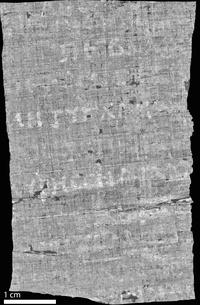Oxford researchers use AI and X-ray imaging to digitally explore ancient Roman scrolls that haven’t been read since the first century AD.

For centuries, the Herculaneum scrolls stood as one of history’s great enigmas — ancient texts reduced to brittle carbon by the eruption of Vesuvius in 79 AD. Now, a novel Oxford research project, in association with the
Vesuvius Challenge, is using X-ray imaging and artificial intelligence, to digitally unravel these scrolls.
The project’s groundbreaking approach has drawn widespread media attention, with recent features in a number of publications, including the
BBC,
The Guardian,
Forbes and
CNN.
Several of the Herculaneum scrolls are housed in the Bodleian Library, and one of these, PHerc. 172, scanned at the
Diamond Light Source in Oxfordshire, has proven perfect for just this new process, as the chemical composition of its ink shows up more visibly in x-ray scans.
Early attempts in November revealed tantalising glimpses of text. Last week the Oxford research team saw the first attempts to unroll the scroll and reveal sections of continuous text, and they were able to decipher individual words and features of the papyrus. Dr Michael McOsker, a papyrologist from UCL working on the project, describes this moment of discovery:
Particularly exciting for me was that we found a second occurrence of a word I first saw in November — διατροπή (diatropē), "disgust." There are a few other words that suggest it's a text about ethics. Other features, like the handwriting and layout, line up with what we expect from other rolls in the collection. There's reason to think it's by Philodemus of Gadara — one of his favourite words seems to be in the text, and most of the Herculaneum library is by him, but it's too early to say much of anything for sure.
Although the project is still in its early stages, this is already a significant breakthrough and demonstrates the value and real-world impact that Classics can offer. By bridging the gap between ancient texts and modern innovation, the project reaffirms the enduring relevance of Classics, offering fresh insights into history, philosophy, and the very foundations of human thought. As Dr McOsker expands:
This roll and the whole library are going to rewrite whole chapters of intellectual history, not only about literature and Epicurean philosophy, but about all the other schools of thought and ideas that the authors in the Herculaneum library engaged with. We'll learn more about Stoicism and ancient Skepticism as well, for instance, and who knows what else. Brand new texts are tremendously exciting and have the potential to change the way with think about the ancient world!
This new material, in addition to its intrinsic interest, could significantly reshape our understanding of contemporary or near-contemporary literature, which with figures like Virgil and Horace is heavily engaged with philosophy in general and Epicureanism in particular.
This project is a testament to the power of interdisciplinary collaboration, bringing together physicists, computer scientists, and classicists from across Europe and the U.S., spanning universities, the private sector, and dedicated amateurs. As Dr McOsker affirms:
I can't do anything that the computer science people are doing, and they don't know Greek or the history of ancient philosophy. So there is a need for specialist knowledge, for specialists who can collaborate across disciplinary bounds.